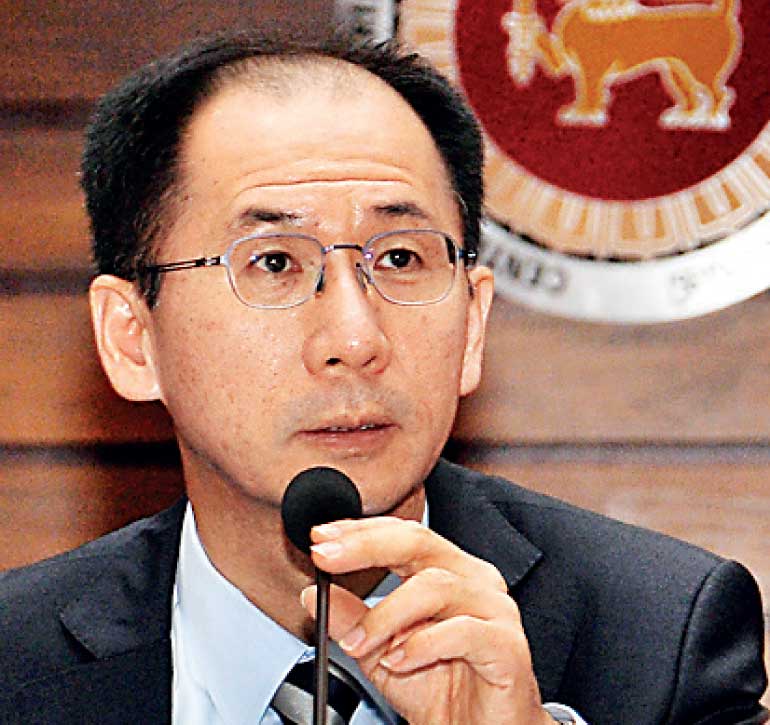Thursday Feb 19, 2026
Thursday Feb 19, 2026
Monday, 2 October 2017 00:25 - - {{hitsCtrl.values.hits}}

IMF Mission Chief Jaewoo Lee - Pic by Ruwan Walpola
By Uditha Jayasinghe
Even as Sri Lanka met all its policy performance targets, the International Monetary Fund (IMF) has called on the Government to strengthen its debt management and stick to reforms on state-owned enterprises (SOEs), which would include transparent energy pricing to be rolled out next year.
The IMF staff team led by Jaewoo Lee last Friday outlined that the positive accomplishments of the Government also included the passage of the new Inland Revenue Act. Discussions between the Government and the IMF will continue on the sidelines of the IMF and World Bank Spring Meetings in Washington before the IMF decides on the release of the third tranche of the $ 1.5 billion Extend Fund Facility arrangement between the parties. Nonetheless, Lee was upbeat on Sri Lanka’s performance and stressed delays in the tranche would be unlikely.
“Policy performance has been fully satisfactory. In particular the approval of the Inland Revenue Act, which involves sweeping changes and should provide a solid foundation for continuing improvement in Government finances as well as providing a new systematic and transparent tax regime, which we expect to have far-reaching benefits and generate higher Government revenue that in turn will be able to provide more resources for the Government’s very ambitious structural and development projects,” he said.
The next challenge will be to ensure full and effective implementation of the Inland Revenue Act, he noted, adding that the Government had in its update indicated it was making efforts for the smooth implementation of the new act from April 2018.
“Strengthening of debt management, together with the overall program of improving Government finances, having a bit more systematic debt management strategy will also help and there is an effort already. The Central Bank is continuing its reserve accumulation and this will remain very important to continuously improving stability. At the same time continuing focus on exchange rate flexibility, and commitment to flexible inflation targeting also remain very important.”
Sri Lanka has significant debt payments over the next few years. While debt in 2018 is mostly internal, from 2019 debt repayments are expected to more than double to $ 4 billion dollars. From 2019 to 2022 the Government is earmarked to repay an estimated $ 13.8 billion, according to a Moody’s report released in August.
The IMF has also repeatedly called on the Government to accelerate the rate of public financial management and reform at SOEs, in particular pricing reform for fuel and electricity, which remains to be done.
Transparent pricing for fuel and electricity will reduce losses at the Ceylon Petroleum Corporation and the Ceylon Electricity Board (CEB), but would be a politically challenging step. Having failed to meet its previous targets, the Government “recalibrated” its commitments earlier this year and the changes were noted in the IMF Staff Report released in August.
“Our conversation with the Government over the past two weeks indicates that it is very much on the timetable of Government reform and we expect to see steady progress in due course. We also have seen many initiatives such as improvement of the trade and investment climate, and overall business environment. We expect those efforts to bear fruit and be able to boost competitiveness and private sector-led economic growth,” Lee said.
Lee went on to say the indication is the Government will face the reform process in a more incremental manner, with March and September kept as the target months in 2018 for oil and electricity price revisions. In the meantime, the IMF has also proposed “smaller intermediate” steps. He expressed confidence that the Government had already factored in the pressures of upcoming elections to the recalibrating of structural benchmarks.
“On the actual decisions, we defer them to the judgment and intentions of the Government. Our sense is they will continue with the planned reforms.”
Projections by the Central Bank that the Government will marginally miss its deficit target for 2017 will not have an impact on the IMF assessment, Lee assured.
“There are two measures of Budget deficit. One is overall balance, which was expected to be 4.6% but looks like it will be a little bigger, and the other concept is the primary balance. The main difference between primary balance and overall balance is the interest. Sri Lanka being a high debt country means interest rates are very high, typically around 5% of GDP. So our target was set in terms of primary balance and in this Government finances have been on target and our sense is that it will stay on target till the end of the year.”
He also called on the Central Bank to stand ready to tighten rates and said that given the weather disasters and other challenges, Sri Lanka’s economy would post growth below 4.5% for 2017.
“Credit growth has been gradually declining and while there can be a debate on the right pace of decline, there is a clear change where the speed has receded. The decline is expected to continue and if there is change then the Central Bank should be ready to raise rates. Such monitoring by both the Government and the IMF would continue,” he emphasised.